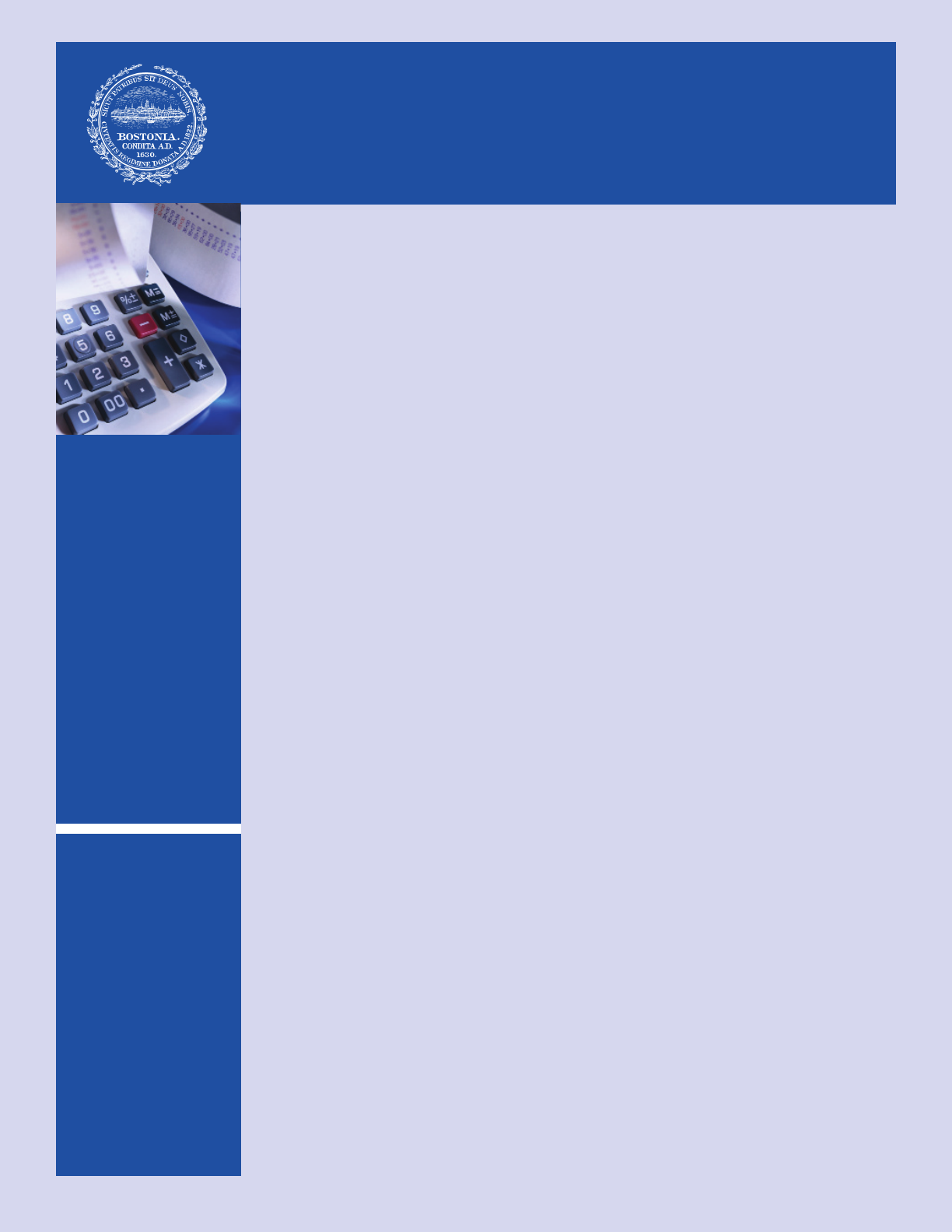
Personal Property Tax
Taxpayer Information
www.cityofboston.gov/assessing
Every business
owner in the
City of Boston
should be fi ling
a Form of List/
State Tax Form 2
of all personal
property owned,
held or leased by
them every year
by March 1
st
.
Most people know that property tax applies to real estate; however, some may
not know that the property tax also applies to personal property. In fact, all personal
property in the Commonwealth of Massachusetts, wherever located, is subject to taxation
unless expressly exempted by law. Most personal property owned by individuals is
exempt. For example, intangible property such as money, stocks, and securities is
exempt. Also, household effects at your primary domicile; furniture, fi xtures, clothing,
etc., tools of a mechanic’s trade, and farm utensils, are exempt. However, property used
by most businesses is subject to local property tax. Business exemptions are applied
based on the type of business ownership, nature of the property, or in some places, like
Boston, total assessed value.
Property that is not
real estate is personal
property and must be
reported.
All owners of tangible
personal property must
complete and file an-
nually a Form-of-List/
State Tax Form 2 with the
assessor in the city in which
the property is located.
A form must be fi led by all
individuals,partnerships,
associations, trusts,
corporations, limited liabil-
ity companies; charitable,
benevolent, educational,
literary, temperance, scien-
tifi c organizations, or other
legal entities that own or
hold personal property in the
City of Boston.
What is the correct form to fi le?
Individuals, partnerships, associations, trusts and
corporations, limited liability companies and other legal
entities that own or hold taxable personal property on
January 1 of each year must fi le a Form of List/State
Tax Form 2.
Individuals owning or holding household furnishings
and effects not located at their domicile on January 1
must also fi le State Tax Form 2HF.
Literary, temperance, benevolent, charitable or
scientifi c organizations that may be entitled to an
exemption from personal property tax must fi le State
Tax Form 3ABC annually. First time fi lers must also
file State Tax Form 1B3. Charitable or non-profit
organizations that do not fi le these forms will be subject
to taxation [M.G.L. chapter 59 §5 clause 3 (b)].
NOTE: All tax forms fi led with the Assessing
Department are NOT open to public inspection.
What if I do not fi le a
Form of List/State Tax
Form 2?
Failure to fi le a Form of
List/State Tax Form 2 will;
1. result in an estimated
assessment, and
2. could result in a 50%
penalty on any abatement
you might otherwise be en-
titled to, as well as the loss
of the right to appeal your
valuation to the Appellate Tax
Board.
Thomas M. Menino,
Mayor
Ronald W. Rakow
Commissioner
City of Boston
Assessing Department
Is my small business subject to the personal
property tax?
Mayor Menino and the City Council adopted a “small
business exemption” for personal property accounts of less
than $10,000 in assessed value. If you own a small business
you still must fi le a Form of List/State Tax Form 2 with the
Assessor every year. If your assessed value is determined to be
less than $10,000 in any year you will receive a full exemption.

What is personal property?
Office furniture & fixtures,
such as; desks, chairs, file
cabinets, lamps, & artwork.
Offi ce equipment such as; com-
puters, printers, telephones & fax
machines.
Store fi xtures and equipments,
such as; shelving, tables, ovens &
signs.
Machinery & equipment of all
kinds, including construction equip-
ment.
Stock in trade or merchandise.
Leased property (should be
reported by both the lessor and the
lessee)
Are corporations exempt from
the personal property tax?
No - business corporations are
subject to personal property tax on ma-
chinery used in the conduct of business,
with some limited exceptions detailed
below. Corporations are also subject
to local taxation on poles, underground
conduits, wires & pipes (generally owned
by utilities or manufacturers).
Massachusetts corporations sub-
ject to taxation under Mass. Gen-
eral Laws Chapter 63, including certain
financial institutions, insurance com-
panies, savings & cooperative banks,
utilities and others are subject to tax on
poles, underground conduits, wires &
pipes, and machinery used in manufac-
ture or in supplying or distributing water.
Is a not-for-profi t organization
subject to the
personal property
tax?
Not usually, however, non-profits
wishing to receive exemption as a
charitable, “literary” or benevolent
group must fi le a form called the 1B3
with the City Assessor. Once designated
a charitable organization by the Asses-
sor, the non-profi t must fi le a 3ABC form
by March 1 of every year in order to
continue the exemption.
What other exemptions are
available on personal property?
Professional tools used by
plumbers, carpenters, auto mechanics
and other trades are exempt.
Property can not be taxed twice.
Property taxed under the corporate ex-
cise tax or motor vehicle excise tax, boat
excise tax, farm animal excise tax, or
mobile home park license fees, can not
be taxed as business personal property.
Intangible personal property is
exempt from local taxation in Massachu-
setts.
In the City of Boston, small
business accounts with a total assessed
value of less than $10,000 are granted
an exemption, the maximum allowed by
law.
For corporations, machinery
used directly in the purchasing, selling
or administrative function, such as cash
registers and typewriters, are exempt.
Corporate-owned computers
are exempt only when used exclusively
for internal purposes such as process-
ing payroll or ordering offi ce supplies.
Computers used in providing a service
to clients are taxable.
Machinery of corporations used
in connection with the laundering or dry
cleaning process, the refrigeration of
goods, or air conditioning of the prem-
ises, is exempt.
Fishing boats, nets & gear – up
to $10,000 in value – owned and used
in a commercial fishing business is
exempted.
For More
Information
Obtain the Form of List/State Tax
Form 2 online at: www.cityofboston.
gov/assessing. Go to FORMS on
the left menu.
Forms
The Massachusetts Department
of Revenue also has a Frequently
Asked Questions Web-page for
personal property at www.mass.gov.
Search for ‘personal property’.
Personal Property consists of any
tangible assets owned by an individual,
a business, or an organization which are
not real estate and which are not perma-
nently affi xed to a particular building. It
includes, but is not limited to:
CALL:
the Assessing Department
Personal Property Unit at 617-635-
1165.
VISIT:
the Personal Property Unit
Room 301 of City Hall. Offi ce hours
are Monday - Friday, 9AM - 5PM.
LOG ON:
for more information
and Frequently Asked Questions at
www.cityofboston.gov/assessing
Email:
personalproper[email protected]
